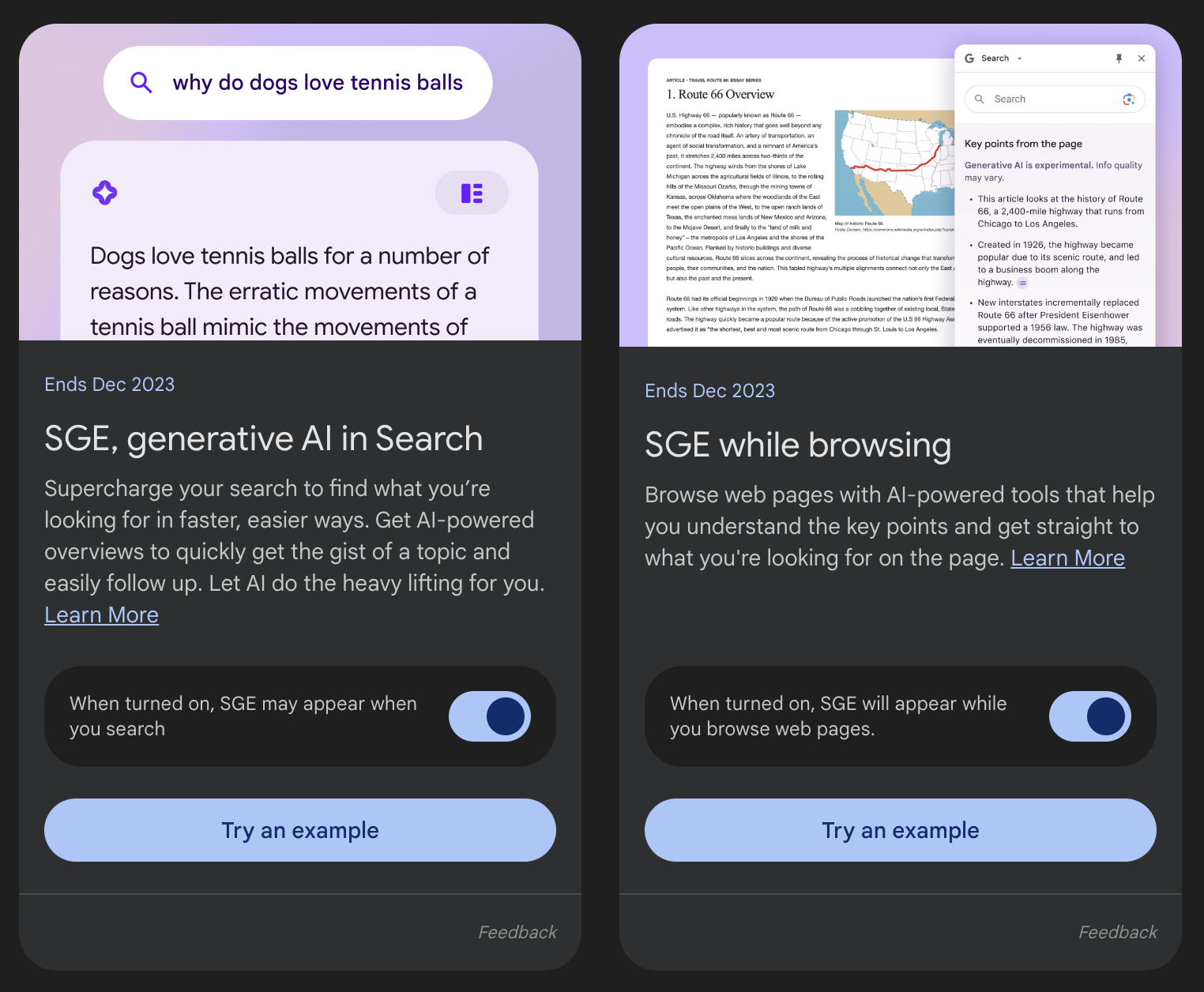In an unexpected turn of events, Google’s Search Generative Experience (SGE), once heralded as a revolutionary generative AI feature set to disrupt search engine result pages (SERPs), is notably shrinking its footprint.
SGE continues to evolve. I'm now seeing what I'm calling "SGE lite" in the SERPs. SGE doesn't trigger a large block by default anymore… it's now much smaller with a large "Show more" button. Again, IMO SGE will not roll out unless it's revenue-neutral or positive… Stay tuned: pic.twitter.com/JSlUJ7V7ef
— Glenn Gabe (@glenngabe) October 7, 2023
SGE, released as an experimental feature in Google Labs, is intended to transform how users engage with search. Generative AI responses appeared in mobile and desktop search results.
Google rolled out SGE with much fanfare, promoting it as the future of AI-assisted search—using generative AI to offer personalized and nuanced answers to search queries.
[SEO Trends 2024] Download the free ebook →

The initial reception was largely positive, with many tech pundits singing its praises. However, the diminished presence of SGE in SERPs over the past few weeks is raising eyebrows.
Abbreviated SGE is Google's answer to the poor Cumulative Layout Shift experience in the early beta.
The good news for SEOs — as displayed, it's not going to impact organic CTR significantly. https://t.co/fganqVjmv7 pic.twitter.com/mFTlCxLOqO
— Ross Hudgens (@RossHudgens) October 23, 2023
Several SEO professionals have corroborated the reduced SGE component frequency in search results.
SGE went from taking over my entire screen for most queries earlier this year, to being "opt-in" only, or not showing at all for most queries in the past month.
In fact, I can't remember the last time it loaded automatically. I imagine most other testers are seeing the same? pic.twitter.com/quuNVzXlBD
— Lily Ray 😏 (@lilyraynyc) October 23, 2023
Why this retraction? Some industry experts speculate it could be due to various factors.
First, there’s the question of accuracy. While SGE has been adept at generating responses, critics argue that the quality of these automated answers may have missed the mark.
I mean, it's all just so bad.
Can you imagine the average non-SEO understanding that all of this advice – despite literally being *from Google* – should be taken with a grain of salt, and is all basically half wrong?
What happened to E-E-A-T? Does it not matter for SGE? pic.twitter.com/cbhanymJ1g
— Lily Ray 😏 (@lilyraynyc) July 12, 2023
There’s also the issue of public perception. Users might find the AI-generated results less trustworthy or nuanced than human-crafted responses.
Google #SGE giving false info about cruise document requirements. This could go so wrong so fast for visa/travel requirement queries. https://t.co/WoWOrPxzBd
— Nate Hake (@natejhake) May 27, 2023
However, Google has remained tight-lipped, offering no formal explanation for the curtailed presence of SGE in its SERPs.
The generative AI feature is available in Google Labs until December 2023 for users in the United States and until February 2024 for users in India.
[Free Download:] Top SEO trends to shape your 2024 strategy
 Screenshot from Google, October 2023
Screenshot from Google, October 2023What makes this especially perplexing is the immense resources Google has invested in generative AI features like SGE, not just financially but also in data and research.
While it’s too early to say farewell to SGE, its diminished visibility is a development that warrants further monitoring.
Given the high stakes of AI in the search engine industry, this retraction may signify a reassessment on Google’s part, which could have ripple effects across the AI and search landscapes.
Fortunately, for SEO professionals, a compacted version of SGE in SERPs means that the generative AI feature is less likely to impact organic search traffic dramatically.
Featured image: NiP STUDIO/Shutterstock





